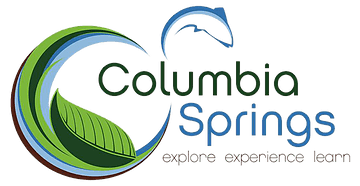My name is Hailey Gerdts, and I have been a Hutton intern at Columbia Springs this summer. Throughout my time here, I have been blessed with connections to many wonderful people and field experiences that have enriched my knowledge of the natural world and environmental conservation.

[Lacamas Creek while electrofishing with Patrick Cooney. (Cooney)]
One of the tasks given to me was to interview different people and ask these two questions: “What does the environment mean to you?” and “Why do you feel it’s important?” As I went out in the field with many of the partners of Columbia Springs and interviewed people from each, the vast array of answers was very interesting and slightly surprising. While they generally shared a few of the more ‘surface-level’ answers, a lot of the meaning behind why they chose a career in environmental studies or what the environment means to them was different.
One of the things I noticed in common between the people I talked to was their passion for nature that started at a young age. Ashley Smithers, the Conservation Specialist at Clark Conservation District, grew up on a family farm. When she was in 11th and 12th grades, she developed a love for biology and pursued it as a career. Patrick Cooney (a Science Director at Smith-Root) became fascinated with animals even younger – he was in elementary school when he found a book about fish and how to become a fish scientist. His mom saw this spark and was very supportive in his passion that eventually led to many different jobs in the environmental industry.

[Rainbow Trout in Lacamas Creek. (Cooney)]
Something that I love about Columbia Springs is their dedication to youth activities. Everyone here is so passionate about the environment and the education team especially is able to voice that passion in a way that excites kids and sparks their interest.
I also noticed that if I talked to someone who had kids, they also came up. Patrick told me that he is a steward of the environment in part because of his daughters. Both girls harbor a love for nature – from camping to hiking to fishing to nature camp. Similarly, when I talked with Jeff Wittler (the Environmental Services Manager at Clark Public Utilities), he mentioned that having kids changed his perspective on the environment. While he had cared about it deeply before, the understanding that his kids would grow up in it shifted his views.

[Electrofishing at Lacamas Creek with Patrick Cooney. Fish collected include multiple species of trout, sunfish, and sculpin, as well as shiners and a lamprey.]
At my two last field experiences, the women I interviewed both told me that they think of the environment as all of the components that make up the world we live on – air, water, soil, cellular growth….the list goes on! Dorie Sutton, an Environmental Scientist at the City of Vancouver, was absolutely fascinated with soil and plants when she was younger. She loved watching how soils modified based on different conditions and the processes that take place in the environment, how everything is connected to each other in some way. Jennifer Poirer (fish biologist at the US Fish and Wildlife Service) thinks of the natural environment initially; the components that sustain us everyday. As someone who grew up immersed in nature – from fishing to camping to just being outside – she learned how to appreciate the natural environment intimately.

[Collecting eDNA samples at Drano Lake with Jen Poirer.]
Even with all of these dramatically different answers, each person who I interviewed had one thing in common with everyone else: they were all passionate about nature and determined to be stewards of the environment, whether that’s through eDNA sampling or watershed restoration or developing new technology for biologists in all fields. Each individual had a huge appreciation for the environment and harbored their own unique love for it, which was incredibly inspiring to see.
Through my time at Columbia Springs, I not only have gained valuable experience in the office, as this was my first job, but I also learned so much that will carry me in the future. All of the people I met and connected with are absolutely wonderful individuals who were excited to talk with me about what they do, and who loved their jobs very much. I feel very fortunate to have been an intern here this summer, and am so grateful for everyone who helped make it happen behind the scenes. While the end is always bittersweet, I know that I will be in contact with many of the people I met in the future.
Hailey Gerdts is a high school senior participating in the American Fisheries Society’s Hutton Internship Program at Columbia Springs for the summer. She has a passion for environmental conservation and takes a special interest in marine mammals, though she is fascinated with and loves all things outdoors! She grew up hunting, fishing, and camping with friends and family all over the PNW. When she isn’t working, you can find Hailey playing piano, reading a good book, or hanging out with her cats.
The Hutton Junior Fisheries Biology Program is an eight week, paid, full time summer internship and mentoring program for high school students sponsored by the American Fisheries Society (AFS). Selected students, known as Hutton Scholars, are matched and mentored by a fisheries and aquatic science professional in their local area to enjoy a hands-on fisheries science experience in a marine and/or freshwater setting. Go to the American Fisheries Society website to learn more.

